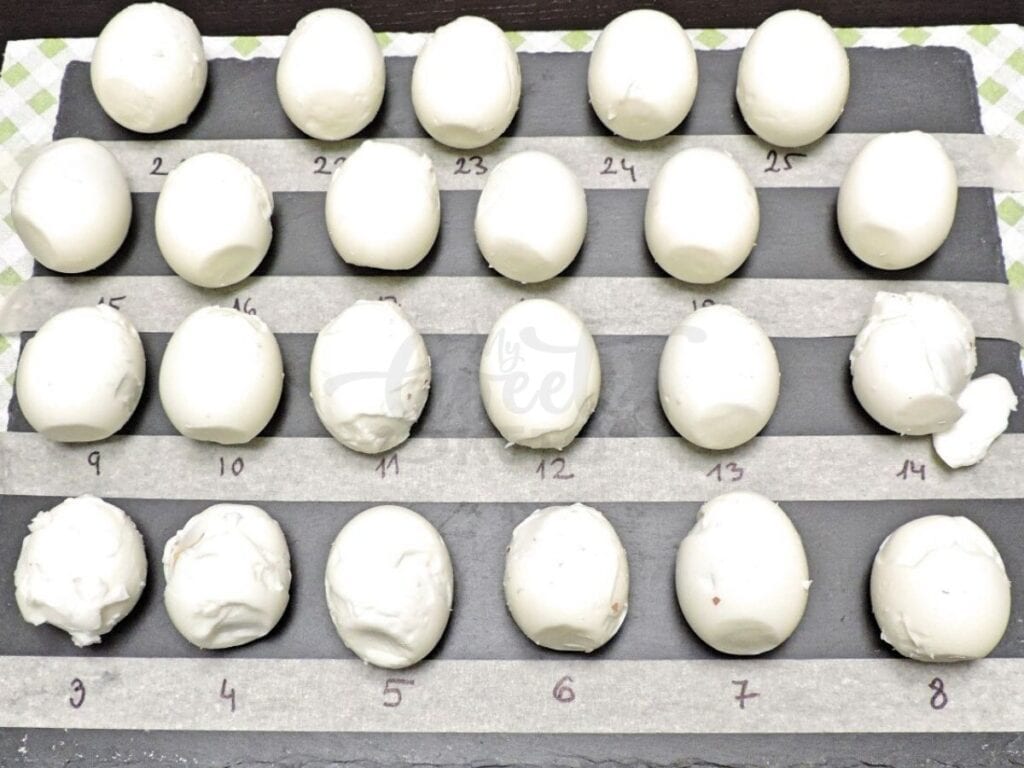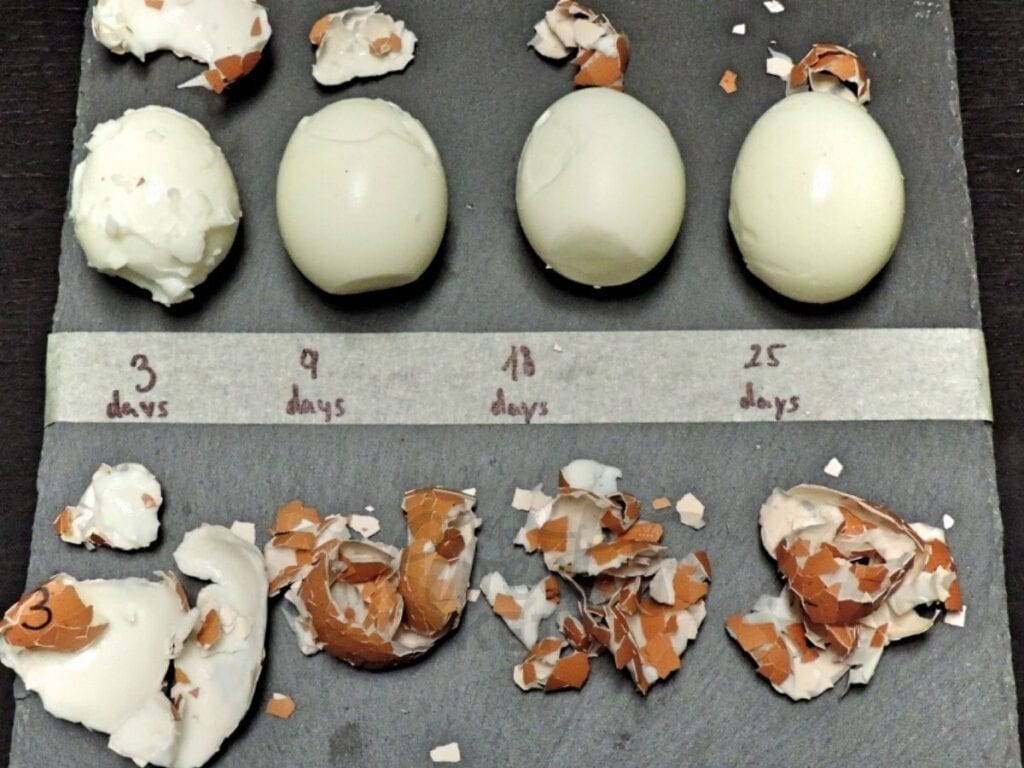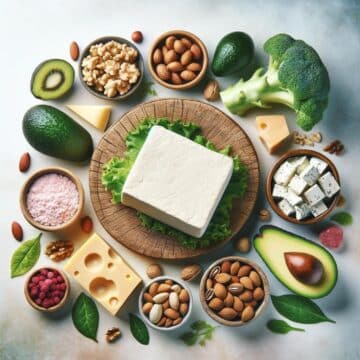Do you know how to egg fast? Even if the answer is no, if you've been living a ketogenic or any low-carb lifestyle, chances are you consume eggs on a regular basis. Where do you tend to buy those eggs? Do you care if they are range-free or not?
In this post, I will not go into the subject of where to buy eggs and whether they are free range and organic. Instead, I'd like to have a few words about the freshness of eggs. How important is it to get the freshest eggs possible?
Do the nutritional values change as the eggs age?
Shelf-life and freshness of eggs
Did you know that the eggs you buy at a retail store can be weeks and weeks old? Yes, the eggs first need to be collected and stored (for an unknown amount of time) by farmers before going into retail stores where they sit and wait for you to buy them. This process can take ages. But, as time passes, it gets more and more important how the eggs are stored to preserve their quality. At room temperature, an egg can lose as much quality in one day as in 4 or 5 days in the refrigerator.
When you buy eggs, it is best to keep them in the carton they came in. The carton needs to be placed in the fridge. It is no good to leave the eggs out at room temperature or even carry them around in a hot vehicle for too long. When kept in an egg carton and refrigerated, clean eggs that are crack-free can go for months! Yes, they have excellent keeping quality. In such a long time, the shell pores might take in odors from other foods, that is why the eggs tray in the fridge door is not the best place for storing.
Does egg quality change with age?
Some of the properties do change as egg ages. For example, carbon dioxide and moisture slowly leak through egg shell pores. This process results in higher pH (more basic). Moreover, the egg's air cell increases because the egg white gets thinner and thinner. The whole egg loses some weight, and with time, especially if not properly stored, can develop a stale odor.
You can easily see if an egg is stale when you break it onto a frying pan or some other flat surface. A stale egg has watery, spread-out white, while cloudy whites usually indicate very fresh eggs. With age, coagulating protein in egg whites decreases, as well as carbon dioxide which is responsible for the cloudy appearance of fresh whites. Despite all of the changes noted above, you should not worry about nutritional alteration taking place in aging eggs. That's good news.
Practicalities - frying or boiling?
At our place, we get the freshest eggs possible straight from a small farm with free-range hens indulging in organic feed. Sometimes I have a privilege of cooking a half-day old egg! Frying: Having very fresh eggs is a great advantage when you love them fried. The coagulating protein in the whites keeps these eggs practically round and of big volume even when they are broken into a pan.
Observe the difference between a fresh and an old egg in the video:
These properties create an unbeatable breakfast experience together with bringing a better feeling of satiety. I looooove fried fresh eggs. Even 3 to 4 weeks "old" eggs keep a nice, dense structure with little volume loss. Sometimes, though, I still need to buy free-range eggs at a retail store. No matter how "fresh," such store-bought eggs tend to have noticeable runny egg whites, indicating they are an unknown number of weeks old.
Boiling: On the other hand, hard-boiled eggs that are too fresh are difficult to peel. The fresher the egg, the more difficult the peeling gets. A few days old eggs, if stored properly, contain more carbon dioxide than old eggs, that is why the fresh egg whites have lower (less basic) pH value.
The difficulty with removing the shell of a fresh boiled egg is associated with the low pH of the egg white. If you want to be able to peel hard-boiled eggs easily, keep them in a fridge for at least a week before cooking.
Egg peeling experiment
At the free-range chicken farm mentioned above, we collected eggs for over 3 weeks. Every day we would collect an egg that would come out of the same hen. This was not hard to do because of very few hens living there. Every day, the egg was labeled so that in the end we knew how old each one was.
At home, I cooked 23 eggs, ranging from 25 days old to 3 days old. They were cooked simultaneously, in the same (huge) pot, being exposed to mutual environmental conditions. I then peeled each and every egg to observe any change in the difficulty of peeling with the age of the eggs.
Results: The freshest eggs (specifically those of up to one week old) were the most difficult to peel. The fresh whites stuck to the skin on the shell, so peeling them resulted in a significant loss of the precious white. This phenomenon was rarely observed in eggs older than one week. Moreover, none of the eggs up to 25 days old peeled as quickly as any store-bought egg. This observation can give us some hint on the age of store-bought eggs.
Conclusions: Eggs up to one week old are best used and consumed fried (due to practical reasons), while, for hard-boiling, it is best to "age" the fresh eggs in a fridge for a week or two. Quality (but not nutritional) differences that age brings do play a significant role. Retail store-bought eggs are usually old enough for immediate boiling and too old for the ultimate experience of frying the eggs for breakfast.
Eggs are nutritious!
If you love eggs or even if you don't, if you are considering doing a short Egg Fast, make sure you read about their nutritional richness and be glad that you enjoy this healthy food!








Beth says
I also have hens and ran into the same peeling problem. Then I bought a COOKS magazine all about eggs. They steamed them in pot of water. It was a longer process that worked well. Then the instapot came around. And amazing. Same day eggs are so easy to peel. If you are interested I can scan and email the cooks article to you.
Tonnia says
I have found that if I steam my fresh eggs in my Instant Pot then I don’t have an issue with peeling them. There is a process of pressure steaming for 5 minutes. Leaving them under pressure for 5 minutes then release pressure and transfer eggs to ice water for 5 minutes. I usually leave in ice water for longer so I don’t have to handle hot eggs. Since cooking my eggs this way I have not had an issue with peeling my fresh eggs. Oh course, Instant Pots have many many more reason to have one but this is my favorite.